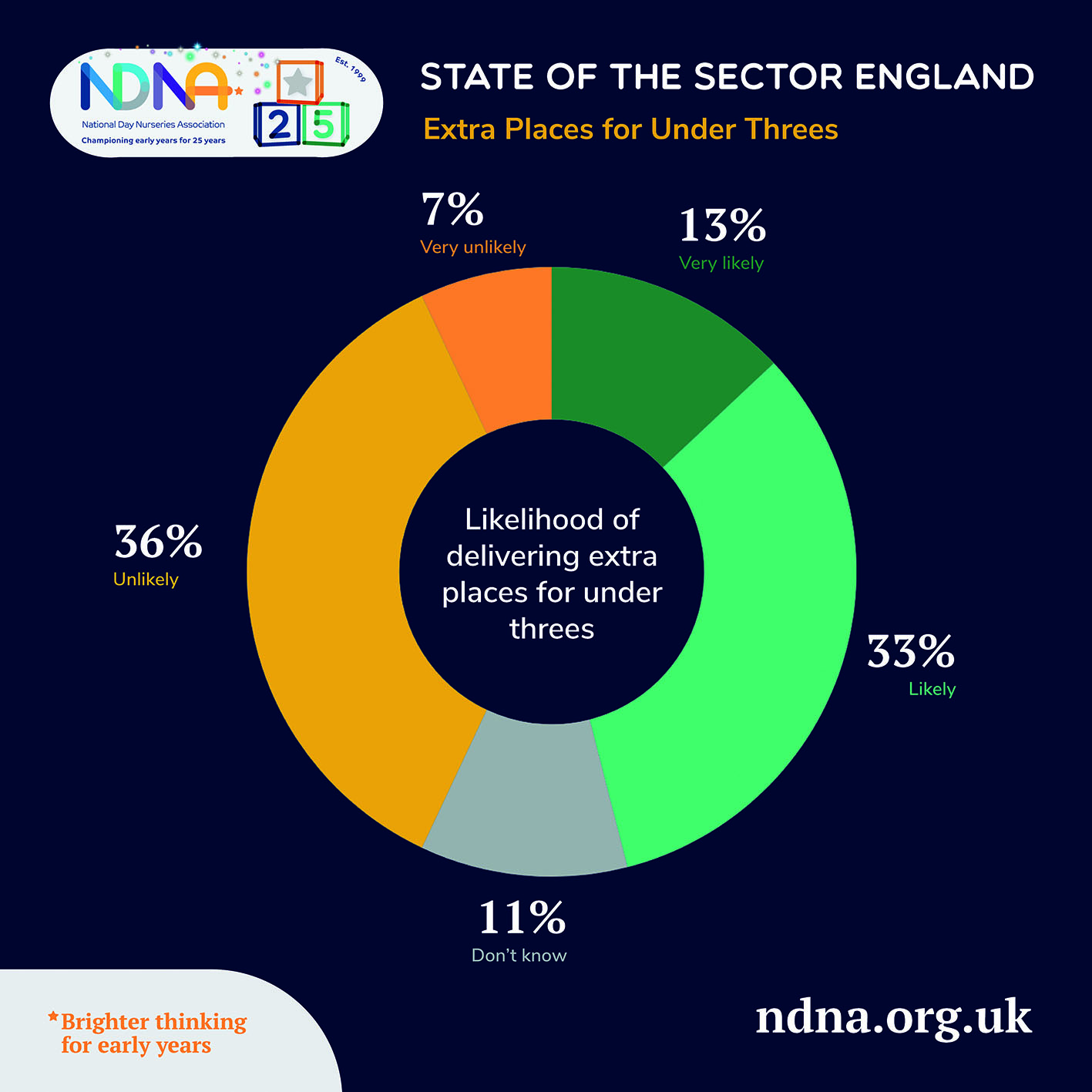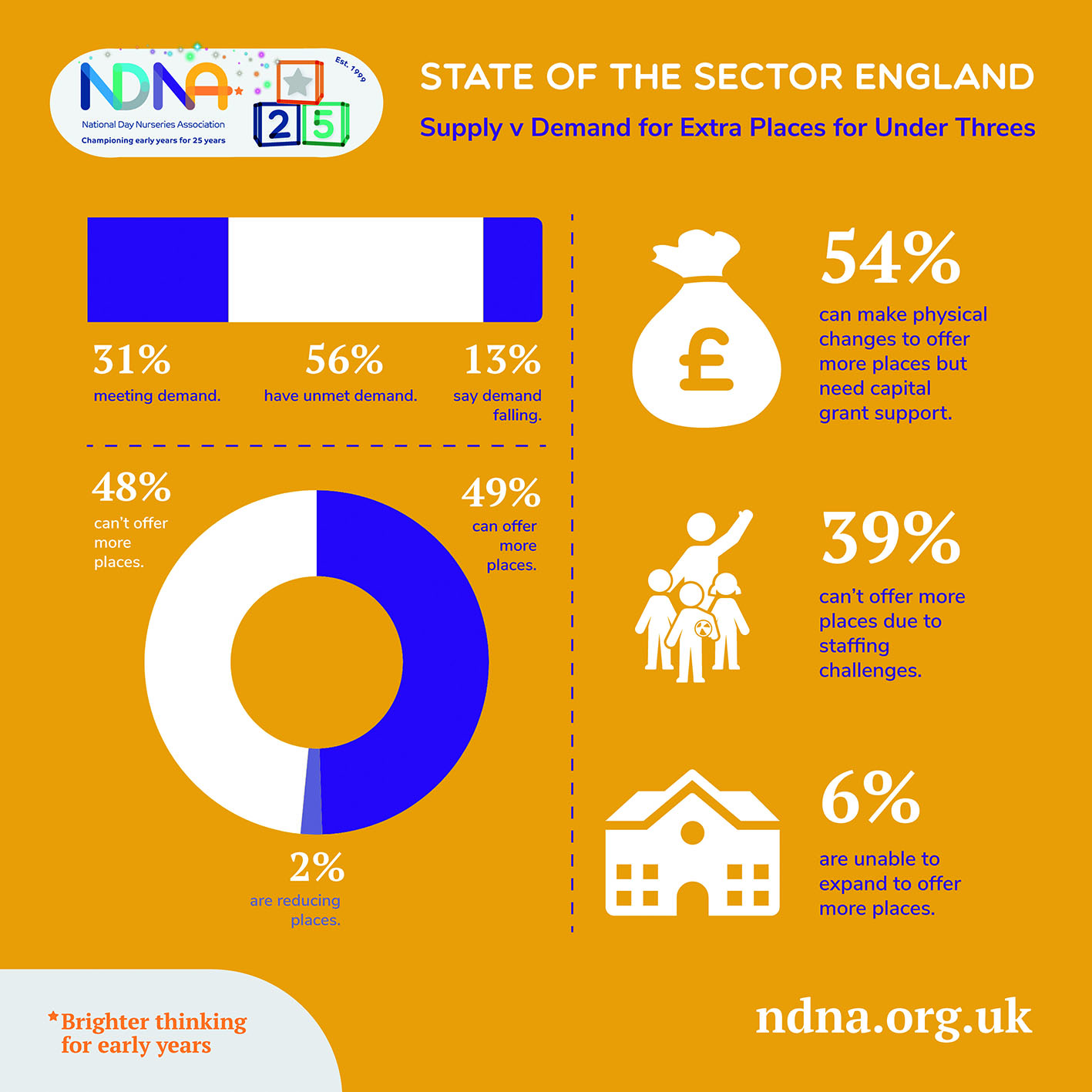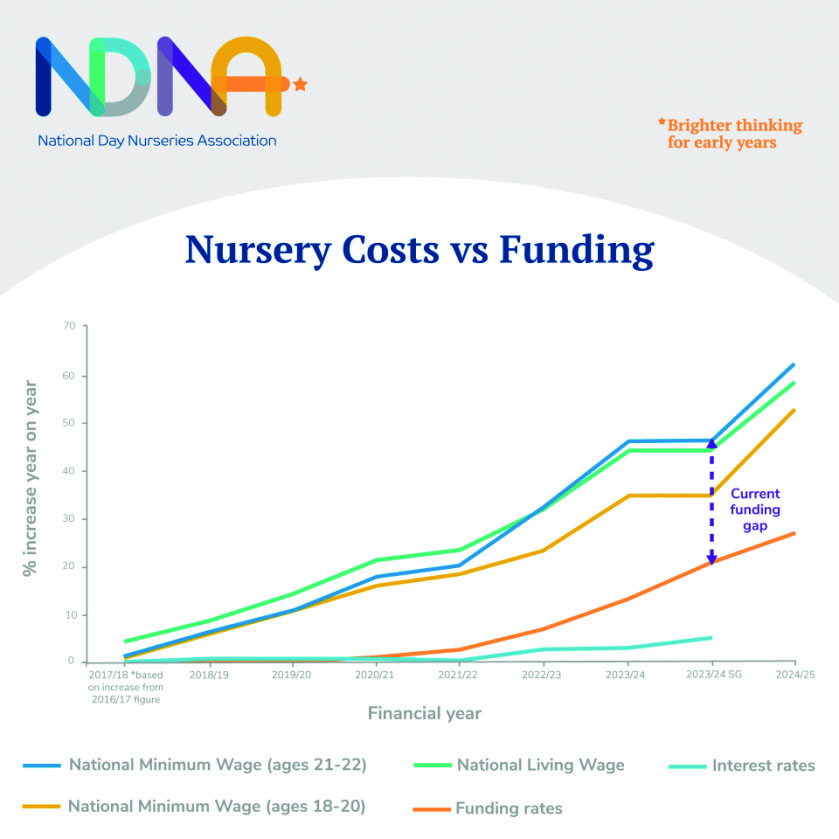
- Early years settings unable to meet demand for two-year-old places
- Many nurseries remain undecided over expanding offer
- Underfunding, recruitment issues and limits to space to blame
With the expanded offer for two-year-olds less than six weeks away, the Government’s promise of places for parents of younger children looks increasingly precarious.
A survey shared with Nursery World by the National Day Nurseries Association (NDNA) has found that more than half of private, voluntary and independent (PVI) nurseries are unlikely to, or don’t yet know whether they will, offer placesfor under-threes.
Meanwhile, the Early Years Alliance, which has carried out a similar provider survey of nurseries, pre-schools and childminders, ahead of the expansion of the funded 15 hours for two-year-olds in England, found that the majority of its respondents expect to struggle to meet demand for the offer.
Both surveys from the two leading sector and membership organisations for early years providers highlight the familiar themes of underfunding, lackof available places and staff shortages, with many respondents stating that they have not yet received notification from their local authority of their funding rates from April, when parents of two-year-olds expect the offer to be available.
 Given the current funding crisis, recruitment challenges, inflation, and rising costs across the board, it is hardly surprising that many nurseries, pre-schools and childminders feel unable to commit to expansion.
Given the current funding crisis, recruitment challenges, inflation, and rising costs across the board, it is hardly surprising that many nurseries, pre-schools and childminders feel unable to commit to expansion.

NDNA’s key concerns are that the PVI sector is not prepared for the Government’s promised childcare expansion due to chronic underfunding over the years, an ongoing recruitment and retention crisis, and lack of capital funding to expand.
With childcare a key focus for an upcoming general election, the Conservatives’ aim to win voters with a family-friendly policy could well backfire, with frustrated parents unable to access the scheme because there simply aren’t enough places to go round for two-year-olds.
The situation looks only to be exacerbated when the funded places are expanded again to parents of nine-month-olds and above, which starts in September.
The findings of both surveys have been released ahead of the Spring Budget on 6 March.
Purnima Tanuku, chief executive of the NDNA, said, ‘We have taken the temperature of the nursery sector at a crucial time and found that it is not as healthy as it should be in order to deliver the Government’s ambitious promises.
‘When the Chancellor announced his plans, the key aim was to boost the economy by supporting working parents. But a week before this year’s Budget, we now know that the majority of nurseries who responded cannot commit to offering additional two-year-old places.’

Will nurseries offer places?
According to the NDNA State of the Sector England survey, just over four in ten PVI nurseries (43 per cent) are unlikely to offer places for under-threes, and 11 per cent said they don’t know if they will do so.
The NDNA survey ran throughout January; it covered 448 nurseries, including single sites, small groups and chains.
According to the Alliance survey, just over two-thirds of those currently offering places to two-year-olds (69 per cent) are planning to offer the scheme.
However, nearly a third arealmost split equally between remaining undecided (15 per cent) or planning to offer a limited number of funded places and charge privately for the rest (13 per cent). Moreover, the Alliance said that 3 per cent of providers surveyed are considering opting out entirely of offering the extended funded hours for two-year-olds.
Financial pressures
Both surveys highlight the stark impact of ongoing financial pressures on providers, which will have a knock-on effect on their offer to parents via fee increases and extra charges.
The NDNA said many parents are concerned at high fees and charges, which may be the only option for nurseries to remain sustainable. However, although staffing bills are rising, around 14 per cent of nurseries are planning to increase parental fees by an average of only 8.5 per cent, which is lower than their main cost increase.
One nursery told the NDNA, ‘Our overall costs have risen significantly and the new minimum wage, although fair, is going to cost us. The pension costs also have a big impact, I am happy to support but the funding is too low.
‘Parents still think it is free and not all are happy to pay top-up fees. We also have to compete with school nurseries who get much higher funding rates and fewer costs, as they are often absorbed in school budgets. Several private nurseries near me have closed, which increases the demand for places. Recruiting is very difficult, as low paid we are not valued as a workforce.’
Meanwhile, the Alliance survey found that 86 per cent of nurseries and pre-schools said the rise to the national living wage will impact their setting finances negatively. Among these respondents, the vast majority said they plan to increase fees to mitigate this, while around half said they would introduce or increase optional charges for trips, meals and snacks.

Sustainability
Tanuku said, ‘The Chancellor must address the huge challenges facing early years providers and focus on measures to support them by increasing funding rates and removing unfair business rates from all early years settings. This is the only way that nurseries can plan for a sustainable future and be able to deliver the increased childcare offer being made to parents.’
When the NDNA asked what changes to the funded policy would enable nurseries to remain sustainable, the top six received in comments were:
- Increase funding rate in line with inflation/wages/usual rates.
- Remove the word ‘free’.
- Pass funding directly to parents/cut out local authorities.
- Make it easier to charge parents for consumables/top-up fees.
- Support with recruitment.
- Remove business rates for nurseries.
Sector capacity
More than half of the nurseries surveyed by NDNA (56 per cent) said there is demand for places they can’t currently meet.
However, a similar proportion (54 per cent) said they could physically expand if they had access to capital grant money.
Staffing is an issue for many, with just under four in ten respondents in the NDNA survey (38 per cent) reporting that they cannot offer places because of a lack of staff.
In the Alliance survey, more than half (55 per cent) of its respondents are already full with a waiting list, while a further 13 per cent are full with no waiting list.
Just 3 per cent of respondents said they had a large number of places available.
One respondent told the Alliance, ‘The funding for two-year-olds and under-twos is being rushed through by the Government with no understanding or thought as to the impact this will have on settings. Parents think that there are spaces available, but our setting – like the majority of settings in our area – is having a staffing crisis with no suitable applicants coming forward to fill our vacancies, which then in turn puts pressure on our staff. I am also worried about delivering the 30 hours from September 2025 and its financial impact on our setting.’
Underfunding for PVI nurseries
According to the NDNA, increases to funding rates over the last year mean that slightly fewer nurseries say funding doesn’t cover their costs, although the numberis still high, with 83 per cent of nurseries reporting a shortfall, rising to 87 per cent in deprived wards.
The NDNA said this figure is significant because nurseries have far more three- and four-year-olds than two-year-olds.
The NDNA survey found an average funding shortfall of £2.36 per child per hour/£1,345 for 15 hours over 38 weeks; £2,690 for 30 hours.
The NDNA said that while the average funding rate has increased by 27 per cent since 2017, wages have increased by between 58 and 62 per cent.
Although the two-year-old rate has increased by 26.5 per cent since April 2023 (and up by 4 per cent for April 2024), it is still not covering the costs for the majority. Unfortunately, some local authorities will be decreasing this amount and all councils will be able to top-slice this by 5 per cent, so many nurseries will receive less than they previously did for their two-year-olds.

Nine-month-old places
The Alliance survey asked providers about whether they planned to offer the funded places for nine-month-olds, due to start in September.
This revealed that a similar proportion of providers that said they would offer the two-year-old funded places said they were planning to offer the nine-month-old funded places when the offer comes in. Some providers (4 per cent) are planning to charge privately, 12 per cent to offer a limited number of funded places and charge privately for the rest, and 17 per cent are as yet undecided on whether to take part or not.
Neil Leitch, CEO of the Alliance, said the findings should send ‘alarm bells ringing through government. With just weeks to go until the roll-out of the extended offer, it is clear that despite the Government’s continued promises, not all eligible families will be able to access the early years places they need.’
The Alliance survey received 1,196 respondents, with just over half (54 per cent) of them nurseries and pre-schools, 43 per cent childminders, and 2 per cent ‘other’.
The survey was carried out online between 25 January and 8 February 2024.
What providers say
NDNA ‘State of the Sector England’ survey
‘Three- to four-year-old funding needs to increase by 30 to 40 per cent. Stop using free childcare to sell childcare to parents.’
‘Asking parents to pay for extras is all well and good but it’s not for extras in reality. It’s to cover any shortfall. In turn… putting up wages (living wage), business rates, costs of energy completely erases any increase in funding. It really is a joke.’
Alliance provider survey
‘Adding more children to the mix will only be adding fuel to a burning building, and eventually it will come falling down.’
‘Chronic sector underfunding has zapped me of all innovation and enthusiasm to keep the plates of a PVI setting spinning. It’s criminal.’









